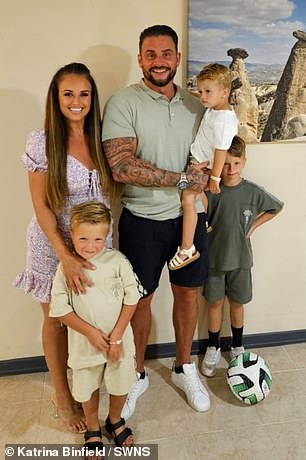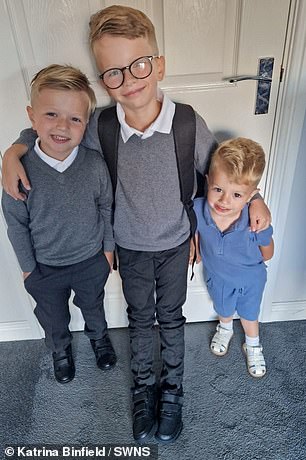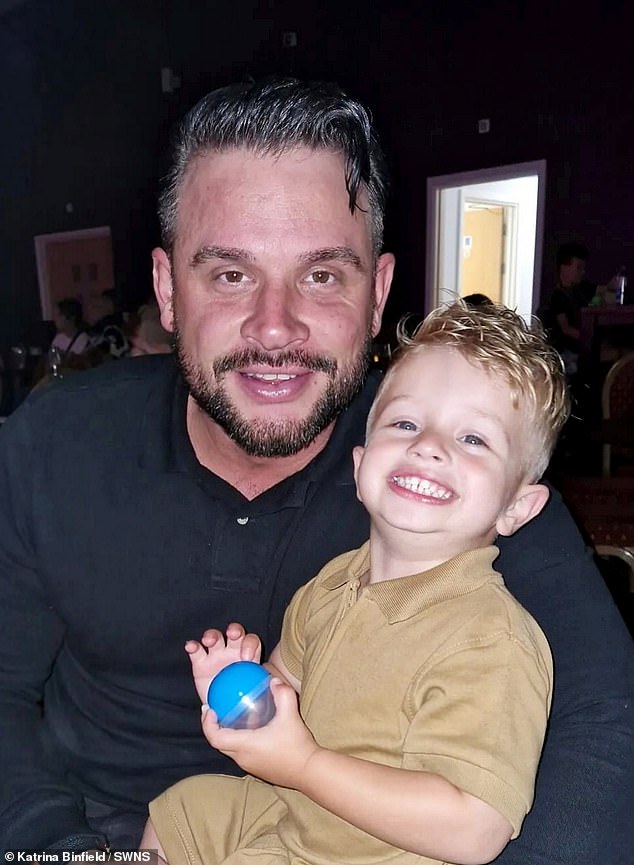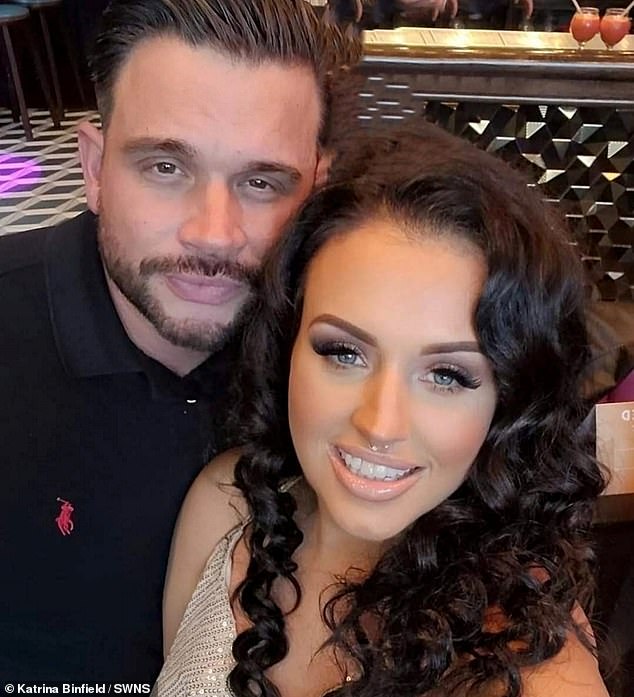
A father-of-three whose headaches ended up being brain cancer has been given 15 months to live.
Ricky Smith, from the Isle of Sheppey, Kent, began suffering headaches in February but initially put it down to him working too much.
After two weeks of unrelenting pain, the 39-year-old site manager’s partner Katrina Binfield urged him to see his doctor, who allegedly told him just to drink more water and rest.
Mr Smith’s agony continued, however, prompting Ms Binfield, 41, to book him in for an eye test that led to him being diagnosed with an inoperable glioblastoma.
Mr Smith is now anxiously playing a ‘waiting game’ to see what treatment he can be offered to prolong his life.
Ricky Smith, 39, a site manager from Isle of Sheppey, Kent, pictured with his partner make-up artist Katrina Binfield, 41








Father-of-three Mr Smith (pictured with his family left) has been given 15 months to live following his brain tumour diagnosis. Ms Binfield broke the devastating news last week to their children (pictured right), Louie, eight (centre), Karson, five (left) and Arlo two (right)
Make-up artist Ms Binfield said: ‘Life is very up and down for us at the minute.
‘There are days when Ricky can be confused and forgetful and there are days where I can see the changes in him.
‘That is really hard, I am watching my partner change in front of my eyes.’
Speaking of his initial symptoms, she added: ‘He started getting constant headaches for a couple of weeks.
‘We thought at first it may have been a virus. I was ill just before but his lasted longer than mine.
‘He is a hardworking man and never takes time off, but he was starting to call in sick and just sit around the house.
‘I said to him “Rick this isn’t you” and “we need to get you looked at”.’
But when Mr Smith went to the doctor he was told to drink more water and relax but his headaches persisted.
The couple went to Maidstone Hospital in the hopes of being seen but after waiting for several hours, the father-of-three grew impatient and wanted to go home.
Mr Smith went for an eye test at the start of March, during which the optometrist saw blood behind behind both his eyes.
He was referred to Maidstone Hospital, where a CT revealed a mass on the brain.
Mr Smith was reportedly told he may have suffered a stroke before an MRI diagnosed him with a glioblastoma, a type of fast-growing brain tumour.
Recalling that moment, Ms Binfield said: ‘A consultant came over to say that they had found something in his results.
‘He was being very vague, so Ricky said “man to man tell me if I have a tumour”. The doctor confirmed he had a tumour and I broke down.
‘It was horrible, I just broke down but Ricky was trying to be strong.
‘A woman across from us burst into tears, you look at us we’re a young family — you don’t expect this.’
Around 2,500 Brits and 12,000 Americans are diagnosed with a glioblastoma every year.
Headaches, seizures, nausea, drowsiness, vision problems and personality changes are key symptoms.
These are caused by the tumour increasing pressure inside the skull as it grows.
Surgery, radiotherapy and chemotherapy are go-to treatments.
There can be a life expectancy of just 12 to 18 months from glioblastoma diagnosis and in many cases it comes back, even after being treated, according to The Brain Tumour Charity.
Mr Smith was diagnosed with a butterfly glioblastoma, meaning the tumour crosses both sides of the brain.




Mr Smith (pictured with his son Arlo) started getting headaches but originally put it down to the fact he was a hard worker and thought nothing of it




The couple’s friends have set up a GoFundMe page in the hope of raising £75,000 to pay for private treatment, a 40th birthday for Ricky and a wedding
Last week, Ms Binfield broke the devastating news to their children, Louie, eight, Karson, five, and Arlo, two.
She said: ‘Arlo is too little to understand but I sat Louie and Karson down last week.
‘Louie is such a sensitive soul so I was really worried about him.
‘He got up, gave me a hug and said “don’t worry mum we will fight this”.
‘Karson and I were crying and he got us tissues and wiped our eyes.
‘He has been amazing but it still doesn’t feel like this is happening to us.’
The couple’s friends have set up a GoFundMe page in the hope of raising £75,000 to pay for private treatment, a 40th birthday for Ricky and a wedding.
It has already raised £71,000 from 2,300 donations.